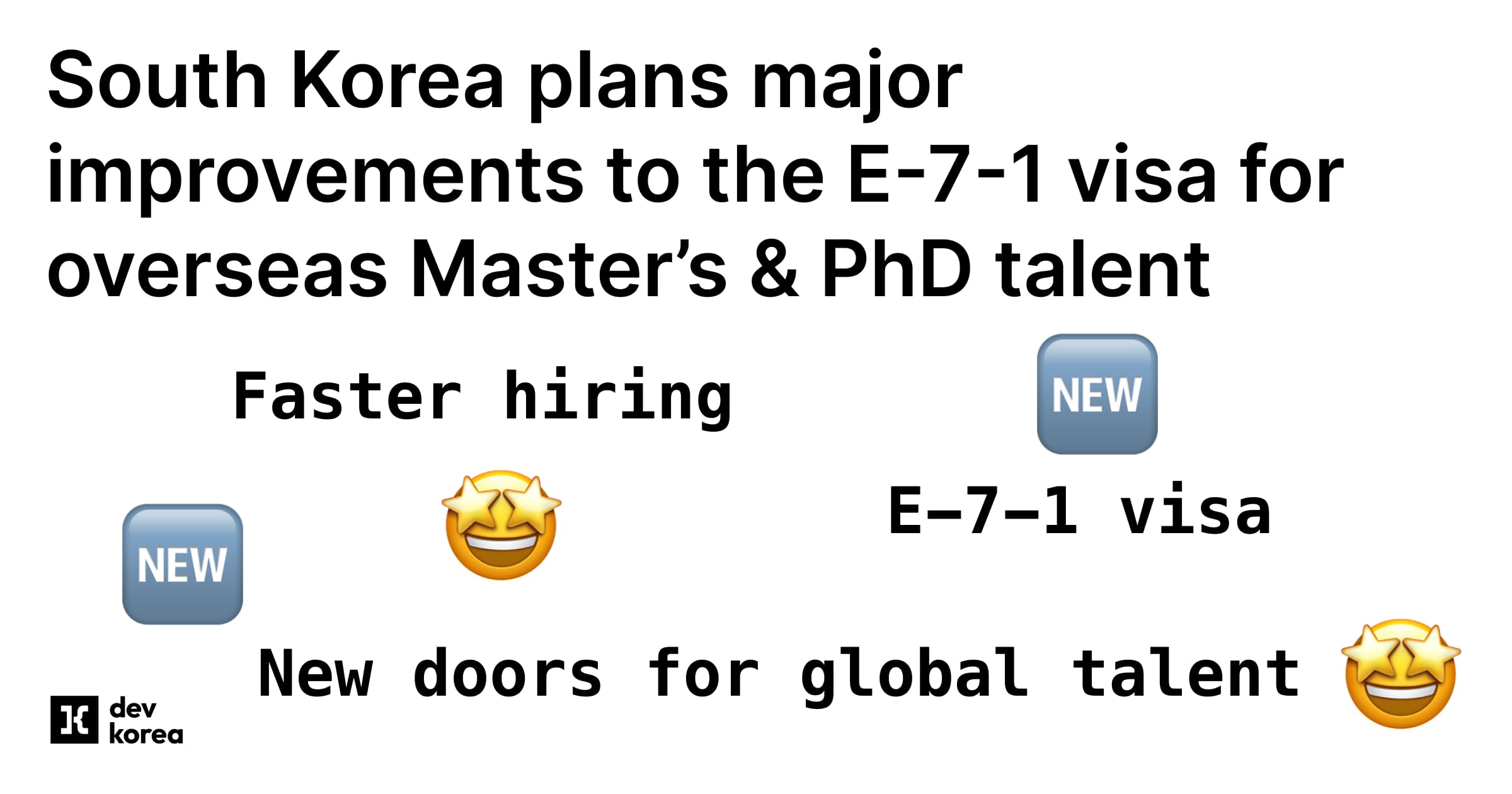
한국, 해외 석·박사 인재를 위한 E-7-1 비자 제도 개선 추진
TL;DR
대한민국 정부가 E-7-1 고용추천제(외국전문인력 고용추천제)를 대대적으로 개선하는 방안을 검토 중이다.
현재 논의되는 방향에는 다음이 포함된다:
- 이제까지처럼 국내 대학 졸업자 중심이 아니라, 해외 석·박사급 고급 인재도 직접 채용할 수 있도록 지원
- 우선 협력 국가 선정
- 심사 절차 간소화 및 신속화
- 학력·경력 검증 강화
- STEM 중심에서 비-STEM 직무로의 확대
이 개선안이 실행된다면, 스타트업과 중소기업은 해외 고급 인재를 더 쉽게 채용하고, 글로벌 인재에게는 더 넓은 기회가 열릴 수 있다.
대한민국 정부는 중소벤처기업부(MSS)와 KOSME가 운영하는 E-7-1 외국전문인력 고용추천제의 개선을 검토하고 있다.
중요한 점: E-7 비자 자체는 이미 존재하고, 기업은 기존에도 일반 E-7 절차를 통해 해외 인재를 채용할 수 있었다. 이번 검토는 E-7 비자를 대체하는 것이 아니라, 중소기업의 채용을 지원하는 “고용추천제(E-7-1)” 라는 별도 트랙을 개선하는 것이다. 공식 발표된 정보는 아직 제한적이다. 정부 연구 용역과 개선안의 내용을 다룬 몇 안 되는 보도 중 하나가 아시아경제 기사다. 여기서 다뤄진 내용들은 연구·검토 단계이며 아직 확정되지 않았다.
현재 외국인 전문 인력의 한국 진입에는 다양한 경로가 있다:
- 해외에서 바로 E-7 스폰서십
- D-10(구직비자) 후 E-7 전환
- 국내 대학 졸업(D-2) 후 E-7 전환
그렇다면 정부는 지금 정확히 무엇을 바꾸려는 것일까?
정부는 중소벤처기업부(MSS)의 E-7-1 ‘고용추천제’ 를 확대하고 간소화하는 방안을 검토하고 있다. 이 제도는 일반 E-7 요건을 충족하기 어려운 중소기업(SME)을 위해 MSS가 추천서를 발급해 외국 인재 채용을 지원하는 선택적 제도다.
지금까지 이 추천제는 주로 이미 한국에 있는 외국인 유학생을 중심으로 운영되어 왔다. 하지만 정부는 앞으로 해외에 있는 고급 전문 인력까지 중소기업이 유치할 수 있도록 제도를 확대하는 방안을 검토 중이다.
1. ‘국내 대학 졸업자 중심’ 구조를 해외 인재까지 확대
현행 E-7-1 추천제는 주로 다음을 지원한다:
- 한국에서 학위를 취득한 외국인
- MSS가 지정한 24개 직종 종사자 (참고: 이 24개 직종은 MSS 고용추천제 전용 목록, 전체 E-7 직군과는 별개)
기업이 일반 E-7 절차를 통해 해외 인재를 채용하는 것은 원래 가능했지만, MSS 추천제 자체는 해외 인재를 대상에 포함하지 않았다.
이번 개선안은 다음과 같은 인재를 새롭게 추천 대상으로 검토한다:
- 해외 석·박사급 고급 연구·기술 인력
- 세계 주요 대학 출신의 전문 인재
- R&D·기술 중심의 핵심 인력
즉, 일반 E-7을 대체하는 것이 아니라, 중소기업을 위한 보조 트랙을 강화하는 개념이다.
2. 글로벌 채용을 위한 우선 국가 선정
정부는 최소 5개 이상의 우선 협력국을 선정하는 방안을 검토 중이다. 기준은 다음과 같다:
- 인재 공급 가능성
- 학력·경력 검증 신뢰도
- 한국 산업과의 연계성
- 행정 안정성
- 문화적 적합성 이로써 중소기업이 해외 인재를 보다 체계적으로 채용할 수 있게 된다.
3. 절차 간소화 및 속도 향상
일반 E-7 절차는 다음의 어려움이 있다:
- 처리 속도가 느림
- 서류가 매우 많음
- 전공·업무 매칭 기준이 엄격함
- 특히 중소기업에는 예측 불가능성이 큼
MSS 개선안에서는 다음이 검토되고 있다:
- 행정 병목 감소
- 심사 기간 단축
- 우수 인재 대상 패스트트랙 신설
- 증빙 서류 간소화 이를 통해 중소기업도 보다 쉽게 E-7 인재를 채용할 수 있게 된다.
4. 검증 절차 강화
정부는 학력·경력 관련 문서의 신뢰도를 높이기 위해 다음을 검토 중이다:
- 글로벌 검증 기관과 협력
- 해외 대학과 직접 확인 시스템 구축
- 공식 학력 인증 플랫폼 활용 이는 비자 발급 과정의 신뢰성을 높이고 예측 가능성을 강화한다.
5. STEM 직무에서 비-STEM 직무로 확대
기존 MSS 추천제는 STEM 위주였다. 현재는 다음과 같은 비(非)STEM 직무 추가를 검토 중이다:
- 해외 영업
- 제품 기획
- 마케팅
- 국제 사업 운영
- 글로벌 오퍼레이션
즉, 기술 직무뿐 아니라 한국 기업의 해외 확장에 필요한 역할까지 포함하는 방향이다.
왜 중요한가?
이번 개편은 새로운 비자를 만드는 것이 아니다. 기존 E-7-1 추천제의 지원 폭을 넓히고 효율성을 강화하는 개선안이다.
만약 시행된다면:
- 해외 인재 채용 절차가 더 빠르고 쉬워지고
- 승인 예측 가능성이 높아지며
- 해외 석·박사 인재의 새로운 한국 진입 경로가 열리고
- 서류 부담이 줄어들고
- 한국 중소기업의 글로벌 경쟁력이 향상된다.
Dev Korea에게 의미하는 것
만약 MSS 추천제가 해외 인재까지 지원하게 되면:
- Dev Korea를 통해 한국 기업이 더 다양한 글로벌 인재와 연결될 수 있고
- 해외 인재에게는 더 명확한 한국 취업 경로가 생기며
- SMEs는 MSS의 추천이라는 ‘지원 장치’를 통해 채용에 대한 자신감을 갖게 되고
- Dev Korea는 기업/인재 모두에게 더 정확한 가이드와 도구를 제공할 수 있다
요약하자면, 이 개선안은 Dev Korea가 더 많은 글로벌 인재를 한국 기업과 연결하는 데 큰 기회가 될 수 있다.
향후 일정
현재 정부는 연구용역을 진행하며 구체적인 개선안을 검토 중이다. 향후 공식 발표에서 확인해야 할 내용은:
- 선정될 우선 국가
- 추가될 직군
- 패스트트랙 운영 방식
- 필요 서류
- 시행 시기 정부 공식 발표가 나오면 Dev Korea가 가장 빠르게 업데이트를 제공할 예정이다.
참고: 비자 제도는 변경될 수 있다. 최신 정보는 반드시 대한민국 출입국·외국인청 또는 전문 행정사·변호사를 통해 확인해야 한다.
다음 커리어를 탐색할 준비가 되셨나요?
Dev Korea에서 최신 채용 공고를 확인해 보세요. 기업이라면, 채용 공고를 등록하고 한국의 혁신 생태계에 기여하고자 하는 글로벌 테크 인재 커뮤니티와 연결될 수 있습니다.